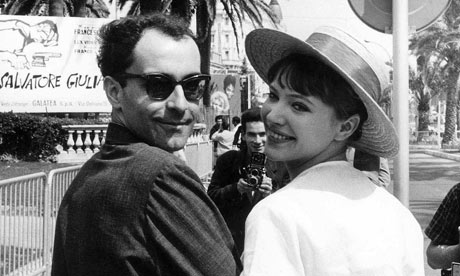
Godard with Anna Karina in the 60's
1.
Film Director Jean-Luc Godard's solution to Europe's financial crisis:
The Greeks gave us logic. We owe them for that. It was Aristotle who came up with the big 'therefore'. As in, 'You don't love me any more, therefore . . . ' Or, 'I found you in bed with another man, therefore . . . ' We use this word millions of times, to make our most important decisions. It's about time we started paying for it. "If every time we use the word therefore, we have to pay 10 euros to Greece, the crisis will be over in one day, and the Greeks will not have to sell the Parthenon to the Germans. We have the technology to track down all those therefores on Google. We can even bill people by iPhone. Every time Angela Merkel tells the Greeks we lent you all this money, therefore you must pay us back with interest, she must therefore first pay them their royalties.
2.
From 'The Black Book' by the Turkish writer Orhan Pamuk:
It was not chance that determined which world had the upper hand or how long its dominance lasted, it was logic. In "any given historical period," the winning side was that which succeeded in seeing the world as a mysterious place awash with secrets and double meanings. Whereas the side that saw the world as a simple place, devoid of mystery and ambiguity, was doomed to defeat and its inevitable consequence, slavery.
The novel's authoritative source, F.M. Ucuncu writing in The Mystery Of Letters And The Loss Of Mystery, continues:
There existed in both the Eastern and Western traditions the idea of a center hidden from the world: the idea in ancient Greek philosophy, the deity in Neoplatonic Christianity, the Hindu's nirvana, Attar's simurgh, Rumi's beloved, the Harufi's secret treasure, Kant's neumenon, the detective novel's culprit. A civilization that lost its notion of such a center could not help but go out of kilter.
3.
- Is freedom the right to use property as you wish, or something else?
- Like what?
- To do something worth doing, for example. The problems with freedom defined as the right to dispose of property is that it cannot be a moral principle.
- Why not?
- Moral principles are universal. What applies to you also must apply to me. But if you own everything and I nothing, and you offer me food in exchange for being your slave, I cannot reasonably accept the property right you claim. You'll need threat of force to compel my acceptance. That's the first problem.
- What's the second?
- Once property is unequally distributed, it tends to get more unequal. Wealth is used to influence the government to lower taxes, allow speculation and permit monopolies to be formed. To stop this from happening requires a very intrusive government.*
- Which limits property rights!
- Exactly.
- What's the alternative?
- To make a starting point where the right to property leaves off: equal distribution of wealth. Make this a principle which, unlike the right to property, is universal, so qualifies as an ethical principle.
- But what difference does that make, to end with an ethical principle or begin with one?
- When you end with the principle, you have built on the threat of violence a coercive state that enforces the principle by threat of violence.
- When it is possible simply to begin with the ethical principle which can potentially be universally agreed to. That's an example of what you mean, the other kind of freedom, to do something worthwhile.
- We choose between two conceptions of freedom, one founded on the threat of force, the other on an idea of what is a good way to live.
4.
From 'The Black Book' by the Turkish writer Orhan Pamuk:
The sleepwalkers passing by on the pavement had lost all memory of this second realm, lost all knowledge of its mysteries, so they were forced to subsist on the shallow certainties of the first world - they were like people who, having lost all knowledge of love, brotherhood, and heroism, found solace in the movies that championed those virtues.
________________
* Why lessen income inequality? Bribery of the government, speculation, and monopoly result in the poor having less money to buy things and the rich not investing in producing new things. A vicious cycle results of more unemployment, lower sales, reduced production. For the rich economic depressions of low production and consumption are intervals of profit taking. The market is cleared as small businesses fail, and foreclosed property may be cheaply acquired. With this profit taking comes a danger of social revolution, though social disruption, like economic disruption, can also be a period of opportunity: social repression creates market openings by making business hazardous to all those without money to buy the protection of the forces of order. When those who bribe the government consider this too risky, for the time being to be avoided, measures may be taken to lessen income inequality. Further Reading: Bloomberg Reports Wall Street Speculators Buying Up Foreclosed Houses Lost In Crash They Caused